13-6. Our present world was
according to the Mayas created in
day 225 in the year 3114
BC, which was 84 days after the First 3-stone Place in day
141.
|
Itzam-Yeh defeated |
28 May (148), 3149 BC |
|
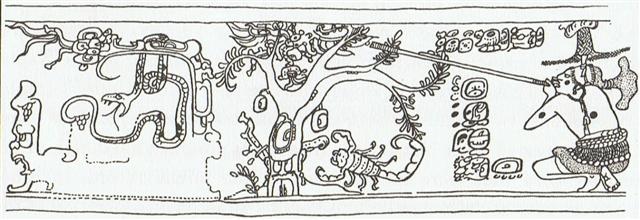 |
|
1st 3-stone place |
21 May (141), 3114 BC |
|
Creation of our present world |
13 August (225), 3114 BC |
|
Och ta chan (Hun-Nal-Ye 'entered or became the sky') |
5 February (36), 3112 BC |
|
21 May, 3114 BC - 5 February, 3112 BC = 542 542 'happens to be' the sum of 365 days and 6 * 29½ nights. |
... In three magnificent texts at the site of Koba, scribes recorded it as one of the largest finite numbers we humans have ever written. According to these inscriptions, our world was created on the day 4 Ahaw 8 Kumk'u. On this day all the cycles of the Maya calendar above twenty years were set at thirteen - that is to say, the cycles of 400 years, 8,000 years, 160,000 years, 32,000,000 years, and so on, all the way up to a cycle number extending to twenty places (2021 * 1360-day year).
|
13. |
13. |
13. |
0. |
0. |
0. |
1. |
5 Imix |
9 Kumk'u |
(Aug. 14, 3114 B.C.) |
|
13. |
13. |
13. |
0. |
0. |
1. |
0. |
11 Ahaw |
3 Pop |
(Sept. 2, 3114 B.C.) |
|
13. |
13. |
13. |
0. |
1. |
0. |
0. |
13 Ahaw |
3 Kumk'u |
(Aug.7, 3113 B.C.) |
|
13. |
13. |
13. |
1. |
0. |
0. |
0. |
2 Ahaw |
8 Mak |
(May 1, 3094 B.C.) |
|
13. |
13. |
1. |
0. |
0. |
0. |
0. |
3 Ahaw |
13 Ch'en |
(Nov. 15, 2720 B.C.) |
|
13. |
13. |
13. |
0. |
0. |
0. |
0. |
4 Ahaw |
3 K'ank'in |
(Dec. 23, A.D. 2012) |
|
13. |
1. |
0. |
0. |
0. |
0. |
0. |
10 Ahaw |
13 Yaxk'in |
(Oct. 15, A.D. 4772) |
|
1. |
0. |
0. |
0. |
0. |
0. |
0. |
7 Ahaw |
3 Zotz' |
(Nov. 22, A.D. 154587) |
In our calendar, this day fell on August 13, 3114 BC. To understand what this means, we need a little scale. The thirteens in this huge number act like the twelve in our cycles - the next hour after twelve is one. Thirteen changed to one as each of these cycles in the Maya calendar was completed ...:
|
We can count 455 (Eb4-22) - 84 = 371 (Eb2-3):
|
 |
 |
 |
 |
 |
 |
 |
|
Eb2-1 |
Eb2-2 |
(326 + 45 = 371) |
Eb2-4 |
Eb2-5 |
Eb2-6 (48) |
Eb2-7 |
|
te maitaki - te maro |
hakanohoa |
e ariki |
te tapamea |
te henua - tau rakau |
no ana ra tau hiva |
ko rapai a haga |
|
VISIBLE CLOSE TO
THE FULL MOON: |
|
λ Tauri (59.3), ν Tauri (59.9) |
4h
(60.9)
JĪSHUĬ
= λ Persei
(60.7)
COR CAROLI (α Canum Ven.) |
υ Persei (61.2) |
BEID (Egg) =
ο¹
Eridani
(62.2),
μ
Persei (62.8)
VINDEMIATRIX ( ε Virginis) |
Al Dabarān-2 (The Follower)
HYADUM I =
γ
Tauri (63.4)
*22.0 = *63.4 -
*41.4 |
HYADUM II = δ¹ Tauri
(64.2) |
Net-19 (Crow)
AIN (Eye) =
ε
Tauri,
θ¹
Tauri,
θ²
Tauri (65.7) |
|
May 19 |
20 |
21 (141) |
22 |
23 |
24 |
25 |
|
THE SUN: |
|
Nov 18 |
19 |
20 |
21 |
22 |
23 |
24 (*248) |
|
υ
Herculis (242.3),
ρ
Cor. Borealis (242.4),
ι
Cor. Borealis (242.5),
θ
Draconis (242.6),
ξ
Scorpii (242.7)
SCHEDIR
(Breast) α Cassiopeiae
*201.0 = *242.4 - *41.4 |
16h (243.5)
ACRAB (Scorpion) =
β
Scorpii,
JABHAT AL ACRAB (Forehead of the Scorpion) =
ω
Scorpii
(243.3),
θ
Lupi,
RUTILICUS =
β
Herculis
(243.5),
MARFIK (Elbow) =
κ
Herculis
(243.7),
φ
Herculis (243.8) |
ψ
Scorpii (244.6),
LESATH (Sting) =
ν
Scorpii
(244.8) |
χ
Scorpii (245.1),
YED PRIOR (Hand in Front) =
δ
Ophiuchi,
δ
Tr.
Austr. (245.5) |
YED POSTERIOR (Hand Behind) =
ε
Ophiuchi,
RUKBALGETHI SHEMALI (Northern Knee of the Giant) =
τ
Herculis
(246.6).
δ
Apodis (246.7),
ο
Scorpii (246.8) |
Heart-5 (Fox)
σ
Scorpii
(247.0),
HEJIAN =
γ
Herculis
(247.2),
ψ
Ophiuchi (247.7) |
ρ
Ophiuchi (248.1),
KAJAM (Club) =
ω
Herculis
(248.3),
χ
Ophiuchi (248.5),
SHE LOW (Market Tower) =
υ
Ophiuchi,
Tr.
Austr. (248.7), ζ Tr. Austr. (248.8) |
|
... The correspondence between the winter solstice
and the kali'i rite of the Makahiki is
arrived at as follows: ideally, the second ceremony
of 'breaking the coconut', when the priests assemble
at the temple to spot the rising of the Pleiades,
coincides with the full moon (Hua
tapu) of the twelfth lunar month (Welehu). In
the latter eighteenth century, the Pleiades appear
at sunset on 18 November. Ten days later (28
November), the Lono effigy sets off on its
circuit, which lasts twenty-three days, thus
bringing the god back for the climactic battle with
the king on 21 December, the solstice (= Hawaiian 16
Makali'i). The correspondence is 'ideal' and
only rarely achieved, since it depends on the
coincidence of the full moon and the crepuscular
rising of the Pleiades ... |
 |
 |
 |
|
Eb4-19 |
Eb4-20 |
Eb4-21 (128, 454) |
|
hoi atu - henua |
te ariki |
henua - kiore |
|
Hoki. To
return, to go back, to
come back; ka hoki ki rá, go back
there! ana oho koe ki Hiva, e hoki
mai ki nei, if you go to the
mainland, do come back here again.
Vanaga. 1. Also, what; ki ra hoki,
precisely there; pei ra hoki,
similitude, likeness; pei ra hoki ta
matou, usage. P Pau.: hokihoki,
often. Mgv.: hoki, also, and,
likewise. Mq.: hoi, surely. Ta.:
hoi, also, likewise. 2. To
return, to turn back, to draw back, to
give back, to tack; mau e hoki mai,
to lend; hoki hakahou, to carry
back; hoki amuri, to retrograde;
hakahoki, to bring back, to send
back, to carry back, to restore, to
renew, to revoke, to remove, to dismiss,
to pay, to pardon, to compress;
hakahokia, given up; hakahokihaga,
obligation. P Pau.: hokihoki, to
persist, to insist; fakahoki, to
give back. Mgv.: hoki, to return,
to retrace one's steps; oki, to
return, to come back. Ta.: hoi,
to return, to come back. Ta.: mahoi,
the essence or soul of a god. Churchill.
Atu. Particle of
meaning opposite to that of mai;
it refers to the second or third person,
expressing movement away:
ka-avai-atu, give it to him:
he-oho-atu au, I am going there,
after you; i-oho-atu-era, when I
had gone there. Vanaga. 1. a. Directive,
of motion from the speaker. b. Somewhat
expressive of the comparative degree. 2.
Pupil; hakaatu, proof; hare
hakaatuga, schoolhouse, class. 3. (hakaatu),
to presage. 4. (hakaatu), mark,
object. Churchill. |
|
VISIBLE CLOSE TO
THE FULL MOON: |
|
Star-25
(Horse)
/
ANA-HEU-HEU-PO-5
(Pillar where debates were held)
ALPHARD (The Horse) =
α
Hydrae
(142.3),
ω
Leonis (142.6),
τ¹
Hydrae (142.7) |
Al
Tarf-7 (The End)
ψ
Velorum (143.3),
ALTERF =
λ
Leonis,
τ²
Hydrae (143.4),
ξ
Leonis (143.5)
*102.0 = *143.4 - *41.4 |
A Hydrae (144.1)
VEGA (α Lyrae) |
|
Aug
10 (222) |
11 |
12 |
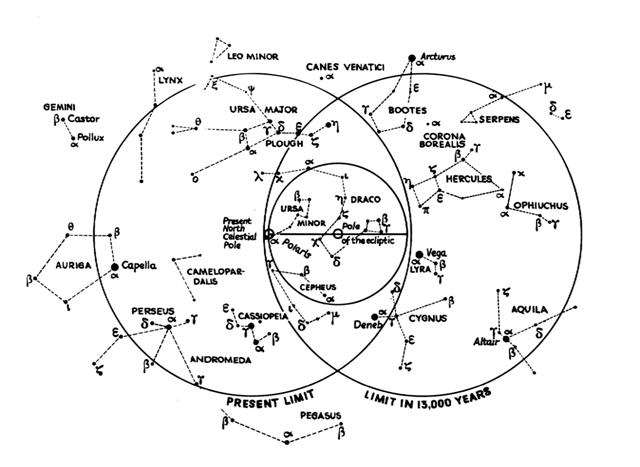 |
|
THE SUN: |
|
Al
Sa'd al Su'ud-22 (Luckiest of the Lucky)
/
Emptiness-11 (Rat)
TSIN = 36 Capricorni
(325.2),
ALPHIRK (The Flock) =
β
Cephei
(325.7),
SADALSUD =
β
Aquarii,
ξ
Gruis (325.9) |
No star listed (326) |
CASTRA =
ε
Capricorni
(327.2),
BUNDA (Foundation) =
ξ
Aquarii
(327.5)
SIRIUS (α Canis Majoris |
|
"Dec 30 (364) |
31
(*285 = *326 - *41) |
"Jan 1 (366) |
|
...
Far away, the Mangaians of old (Austral
Islands, Polynesia), who kept the
precessional clock running instead of
switching over to 'signs', claim that
only at the evening of the solstitial
days can spirits enter heaven, the
inhabitants of the northern parts of the
island at one solstice, the dwellers in
the south at the other ...
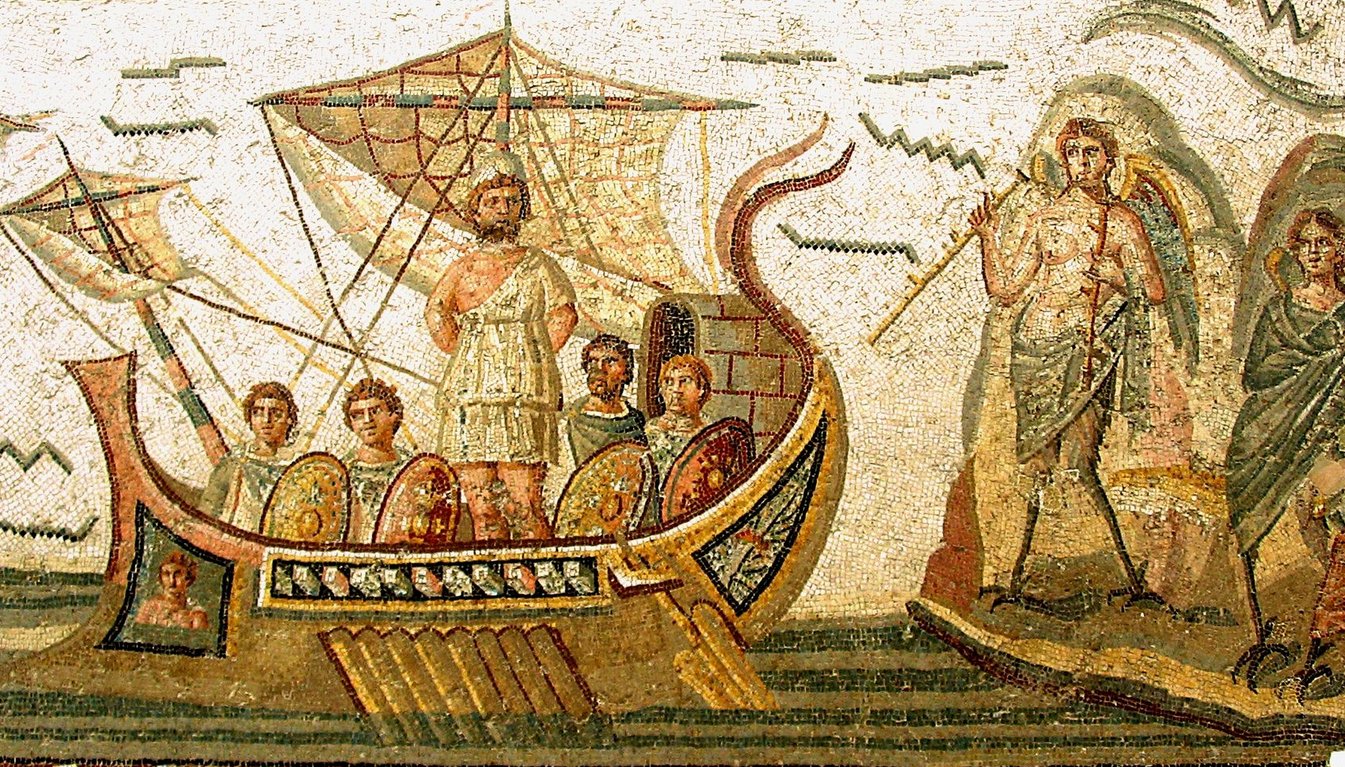 |
 |
 |
 |
 |
|
Eb4-22 (129, 455) |
Eb4-23 |
Eb4-24 |
Eb4-25 |
|
manu rere atu |
manu rere |
manu ariga nuku |
henua - kiore |
|
Rere. To jump; to run; to fly.
Rere-taúra, to carry a child astride on
one's shoulder: ku rere-taúra-á i te poki e
te matu'a ki te gao, the mother carries her
child astride her neck. Vanaga. 1. To fly, to
run, to leap, to scale, to be carried away by
the wind; ika rere, flying fish; rere
aruga, to rebound; hetuu rere,
meteor, flying star. Hakarere, to leap. P
Pau.: rere, to soar, to fly; fakarere,
to precede. Mgv., Ta.: rere, to fly, to
leap. 2. To come, to reach to. Mq.: éé mai,
to come. 3. To swerve, to deviate. (4.
Hakarere, to cease, desist, postpone, quit,
vacation; tae hakarere, perseverance.
Mq.: rere, to disappear. 5. Hakarere,
to save, preserve, put, place, reserve, burden,
destine. 6. Hakarere, to abandon,
forsake, give up, depose, expose, leave, omit,
abjure, repudiate; hakarere ki te hau,
uncover the head; hakarere ki te vie, to
divorce, hakarere ki raro, to put down,
tooa te kiko e ivi i hakarere, to strip
off the flesh. Mq.: éé, to run away, to
escape. 7. Hakarere? Ikapotu hakarere,
to abut, to adjoin; e tahi hakarere,
synonym.) Churchill. Vi.: Lele, the end
of a branch farthest from the body of a tree;
leletha, to bend a branch in order to gather
the fruit on it. Churchill 2. In the present
phase of Polynesian lele so much means to
fly that the plainest way of particularizing
birds is to describe them as the flying animals,
manulele. But to manifest that flight, an
exercise or balancing of wings, was by no means
the primordial sense, for how could that give
rise to a description of water in the
water-courses? It will be no end to mass the
several significations which lele
exhibits ... Flight of birds ... Wind drive ...
Meteors ... To leap ... To run ... Flow of water
... To swim ... To sail ... These several
activities are exercised in earth, air, and
water. The common factor is the swift motion.
The means of motion cut no figure. It is an
invisible means in the driving of the wind, the
flash of the meteor silent athwart the sky on
its lethal errand, the slip and slide of the
stream in its deep course, the set of the sea,
the gliding of the canoe upon its surface.
Churchill 2. |
|
VISIBLE CLOSE TO
THE FULL MOON: |
|
Creation of our present world
UKDAH (Knot) =
ι
Hydrae (145.4),
κ
Hydrae (145.5),
SUBRA =
ο
Leonis
(145.8)
ALPHEKKA MERIDIANA
*104.0 = *145.4 - *41.4 |
5
Imix 9 Kumk'u
Rishu A.-13 (Head of
the Lion)
ψ Leonis (146.4),
RAS ELASET AUSTRALIS = ε Leonis
(146.6)
*105.0 = *146.4 - *41.4 |
VATHORZ PRIOR = υ Carinae
(147.9) |
υ¹
Hydrae (148.4),
RAS ELASET BOREALIS (Northern Head of the Lion)
=
μ
Leonis
(148.7)
*107.0 = *148.4 - *41.4 |
 |
|
Aug 13 (225 =
141 + 84) |
14 (45 + 181) |
15 (227 → 22
/ 7 → π) |
16 |
|
"July 3 (184
= 225 - 41) |
4 |
5 |
6 |
|
THE SUN: |
|
Mahar sha hi-na
Shahū-26 (Western One in the Tail of the Goat)
NASHIRA
(Fortunate One) =
γ Capricorni
(328.0),
ν
Oct. (328.3),
AZELFAFAGE (Tail of the Hen) =
π¹
Cygni,
κ
Capricorni (328.7) |
Arkat sha hi-na
Shahū-27 (Eastern One in the Tail of the Goat)
ENIF (The Nose) =
ε
Pegasi, ERAKIS =
μ
Cephei
(329.2),
46 CAPRICORNI, JIH (the Sun) =
κ
Pegasi
(329.3),
ι
Piscis Austrini (329.4),
λ
Capricorni
(329.6),
ν
Cephei (329.7),
DENEB ALGIEDI
=
δ
Capricorni
(329.8)
*288.0 = *329.4 - *41.4 |
θ
Piscis Austrini (330.1),
λ
Oct.
(330.7) |
KUH (Weeping)
=
μ
Capricorni (331.4),
γ
Gruis (331.5)
*290.0 = *331.4 - *41.4 |
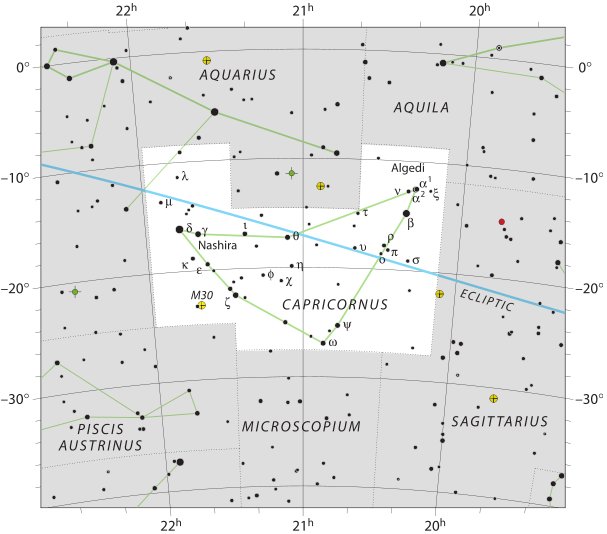
Could the First 3-stone (tau-toru) Place
refer to the string (tui) of stars
('stones') between
γ and λ (→ γ inversed)?
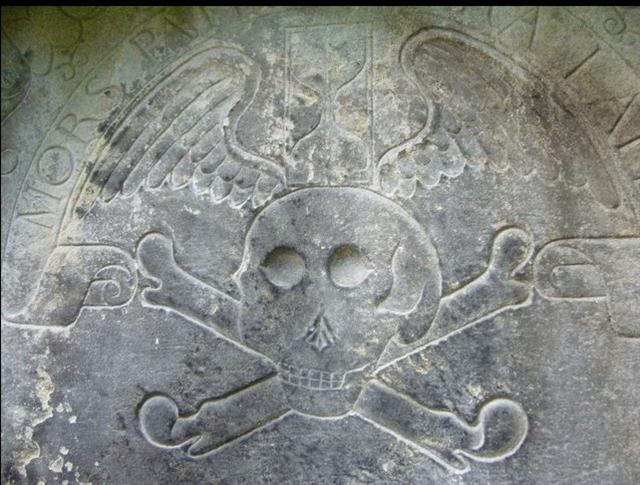 |
|
"Jan 2 |
3 (368 = 185
+ 184) |
4 |
5 (370 = 80 +
290 = 354 + 16) |
When the Mangaians of old kept their precessional clock
running it presumably had began at the sime time as the
precessional clock of the Mayas (and the ancient
Babylonians). The creation of our present world could be
depicted as a man starting to walk
quickly:
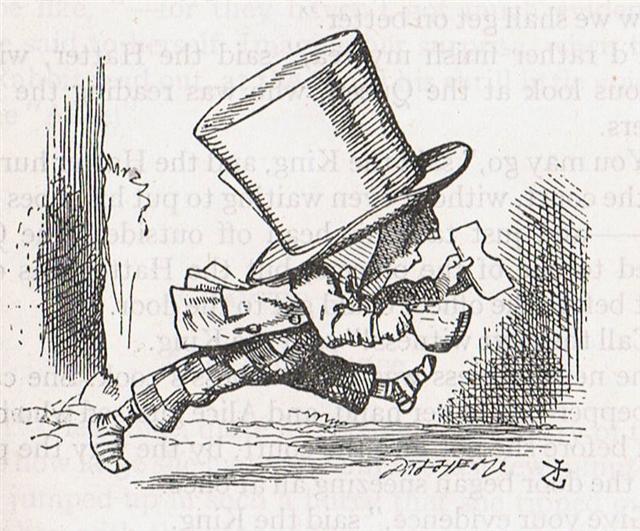
Still much in the dark and without shoes of course.
|
31 = 3 + 28 →
*328 |
|
18 |
4 |
25 |
2 |
9 |
|
knee
→
π |
beginning |
tree |
water princess |
 |
 |
 |
 |
 |
|
119
(→ 118 + 1) |
120 |
121 |
122 |
123 (→ 118 + 5) |
|
*144 = *28 + *116 |
225
→
August 13)
|
κ Centauri (*226.4) |
227 = 327 - 100 |
*148 = *328 -
*180 |
|
*144 + *180 =
*324 |
→
Julian equinox |
*226 + *100 |
BUNDA
(*327) |
NASHIRA (*328.0) |
|
Febr 8 (365 + 39) |
Creation of our present world |
5 Imix 9 Kumk'u |
Aug 15 (227
→ π) |
(408 - 180 = 328
- 100) |
|
Ea5-17
+
119 = 272 |
273 |
274 |
Ea8-17 (275) |
Ea8-18 (→ 328 -
52) |
|
... On February 9
the Chorti Ah K'in, 'diviners', begin the
agricultural year. Both the 260-day cycle and the
solar year are used in setting dates for religious
and agricultural ceremonies, especially when those
rituals fall at the same time in both calendars. The
ceremony begins when the diviners go to a sacred
spring where they choose five stones with the proper
shape and color. These stones will mark the five
positions of the sacred cosmogram created by the
ritual. When the stones are brought back to the
ceremonial house, two diviners start the ritual by
placing the stones on a table in a careful pattern
that reproduces the schematic of the universe. At
the same time, helpers under the table replace last
year's diagram with the new one. They believe that
by placing the cosmic diagram under the base of God
at the center of the world they demonstrate that God
dominates the universe. The priests place the stones
in a very particular order. First the stone that
corresponds to the sun in the eastern, sunrise
position of summer solstice is set down; then the
stone corresponding to the western, sunset position
of the same solstice. This is followed by stones
representing the western, sunset position of the
winter solstice, then its eastern, sunrise position.
Together these four stones form a square. They sit
at the four corners of the square just as we saw in
the Creation story from the Classic period and in
the Popol Vuh. Finally, the center stone is placed
to form the ancient five-point sign modern
researchers called the quincunx ... |
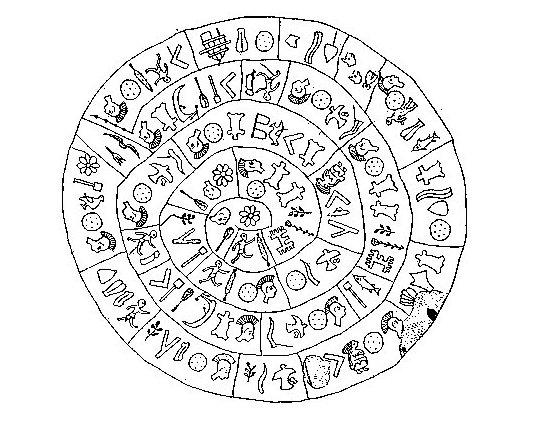
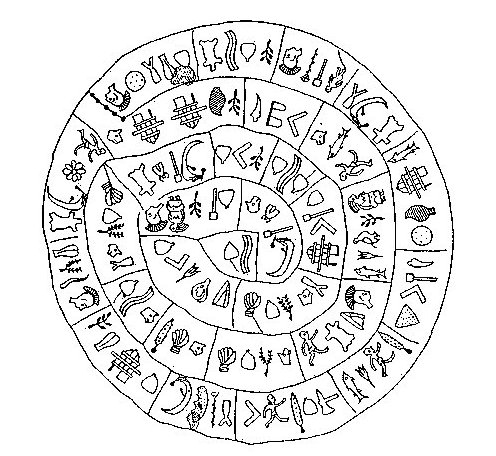
|














